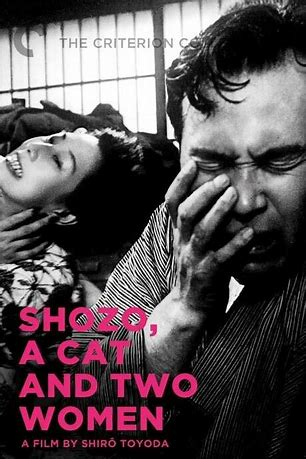Shiro Toyoda’s Shozo, a Cat and Two
Women often feels rather trifling and (at two and a quarter hours) protracted,
but ultimately achieves a bleakly stubborn persuasiveness. As the film starts, Shozo’s
wife Shinaka is more or less hounded into leaving him by his dominating mother,
who wants him remarried to his younger mistress Fukuko, mainly because of
the accompanying financial benefits (Fukuko’s father also holds the mortgage on
their house). Shozo’s erotic attraction to Fukuko (especially, it seems, to her
legs) is made clear enough – the film is quite ribald at times (and striking in
its portrayal of Fukuko’s proud sexual self-determination, for which we’re told
she’s even made the newspapers in the past) – but his only real emotional
affinity is for his aging cat Lily, disliked by Fukuko, and only of interest to
Shinaka as part of her plot to get Shozo back (her options otherwise looking grim).
All of this entails a fair amount of repetitive histrionics, but one driven by
real anxieties about basic survival – Shozo’s immaturity and general inability
to engage with reality (left to his own devices, it’s clear that the little
store from which he makes a meagre living would hardly function at all) seem like
a defense against a hard-edged post-war landscape he otherwise finds impossible
to engage with. Lily being a cat, it’s a recurring mystery over whether Shozo’s
elevated view of her is at all reciprocated, not least at the end, when he
basically leaves the two women (by then seemingly headed for a domestic version
of mutually assured destruction) behind and bets everything on her, leading to
a strikingly desolate ending. The film’s philosophical strands are clunkily underlined
by Shinaka’s brother-in-law, supposedly obsessed by philosophy, which as
manifested here basically just consists of dropping words like “existential”
into everyday sentences (to his wife’s understandable bemusement).


No comments:
Post a Comment